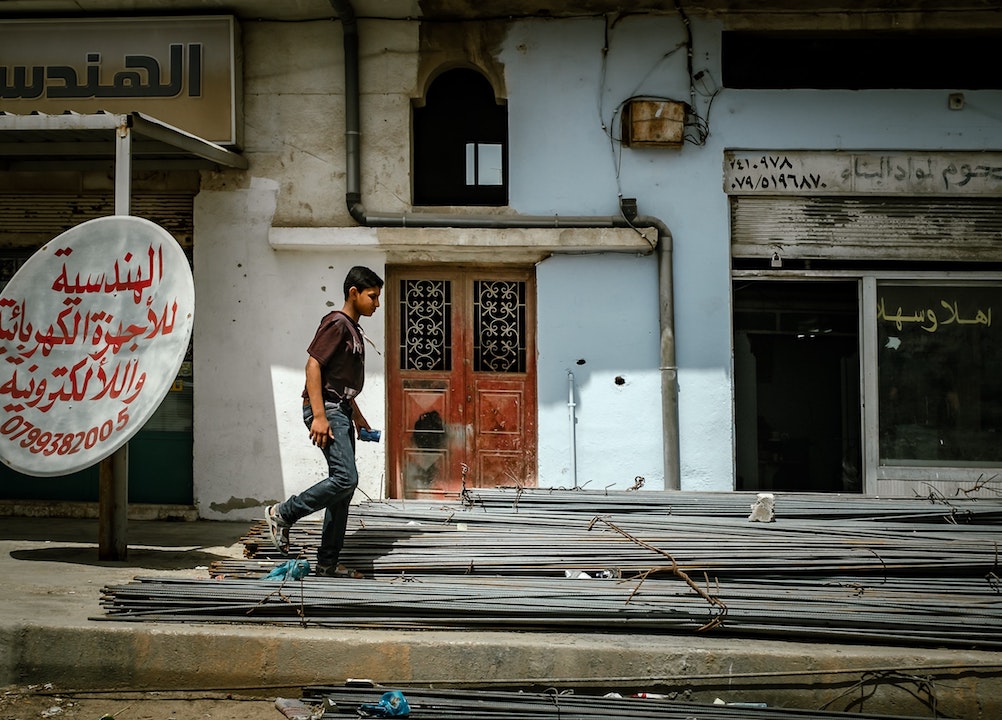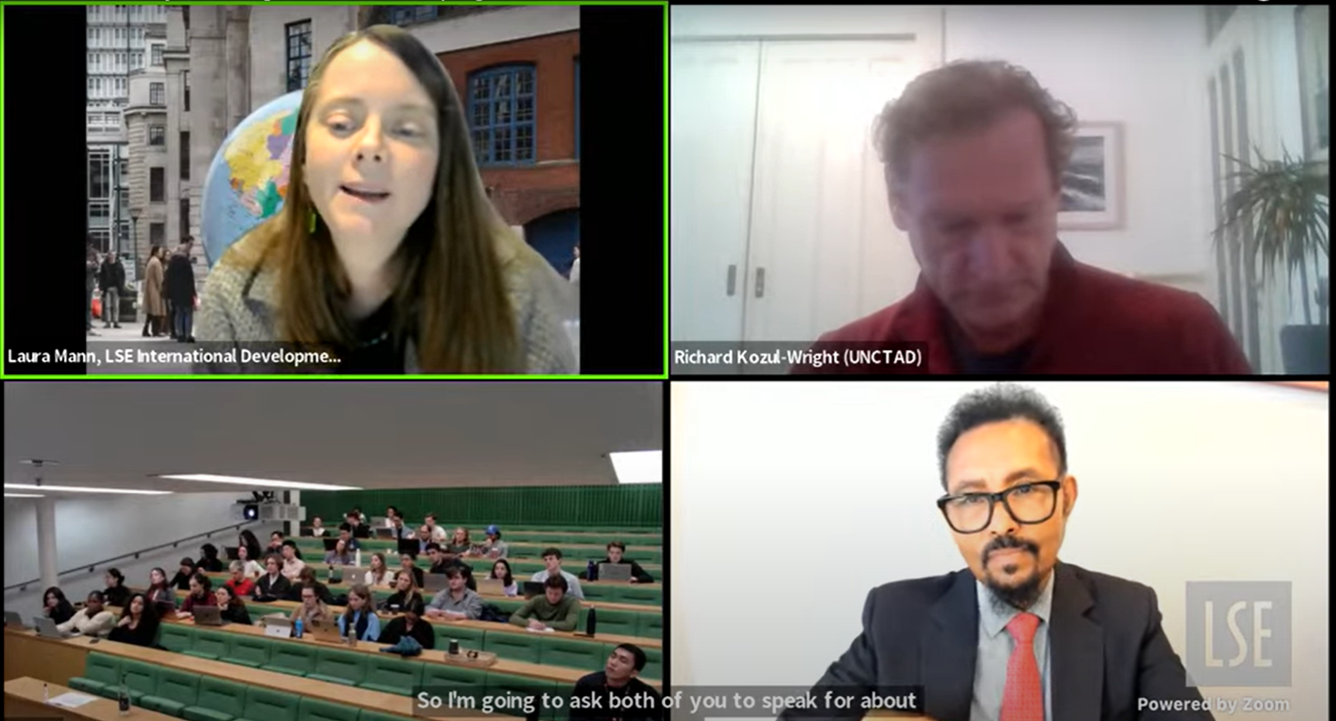On Friday 8 December, Rafeef Ziadah joined us for a ‘Guest lecture on Palestine’ as the final event of the Autumn Term Cutting Edge Issues in Development Lecture Series. Mai Taha joined as discussant. Read what MSc students Ximena Chacon-Herrera, Razan Awwad and Karla Ortiz took away from the lecture below.
You can watch the lecture back on YouTube or listen to the podcast.
The present does not happen in a vacuum. Where we are right now is a construction of our past and our future. Throughout her talk, Doctor Ziadah emphasised the importance of history in understanding the conflict between Palestine and Israel, especially to achieve peace and justice. To start the conversation on development, it is crucial to understand the power relations and colonialism that have been happening for decades. If we do not consider these factors, we will prolong the fruitless approaches that continue until this day. History must be the starting point.
The current paradigms on conflict relations and ‘state-building’ have been proven to be unsuccessful, yet we continue to use them as frameworks for Palestine’s development. This has caused a systemic de-development, defined by Doctor Ziadah as a “process that undermines or weakens the ability of an economy to grow or expand by preventing access to land and utilising critical input needed for local growth”. The ongoing cycle of de-development, together with historical factors and power relations, has created a captive economy in Palestine. These forms of control of the economic structure have a detrimental impact on Palestinians’ daily lives. For this reason, when we speak of development, especially policy making, we must take into account the Palestinian economic dependency concealed in an exploitive relationship.
When we think of conflict resolution, we also have to asses new paradigms. For instance, the honest broker carried out after the Oslo Accords, are key examples of history and structural relations not being considered when looking for solutions. When thinking of new resolutions, we must ask ourselves, “Who has the power in the negotiation?” and “Who is overseeing it?”. Understanding that peace, justice, and an end to the siege must be at the centre of new negotiations will be necessary to avoid repeating the same mistakes from the past.
As passionate people in the humanitarian field, Doctor Ziadah invites us to redefine what development is. It is vital to challenge how development has been continuously put into practice by powerful States, international organisations and aid agencies. If we want peace and justice, it is time to bring new paradigms to the field that respect history, power relations and the rights of return and reparation of Palestinians.
‘If I must die,
you must live
to tell my story
to sell my things
to buy a price of cloth
and some strings,
(make it white with a long tail)
so that a child, somewhere in Gaza
while looking heaven in the eye
awaiting his dad who left in a blaze-
and bid no one farewell
not even to his flesh
not even to himself-
sees the kite, my kite you made, flying up
above
and thinks for a moment an angel is there
bringing back love
If I must die
let it bring hope
let it be a tale’
– Refaat Alareer
Ximena Chacon-Herrera
In the last Cutting-Edge Lecture of this term, Dr. Rafeef Ziadeh takes us through a moving, historical account of the deep power imbalances that Palestinians have experienced. Since 1948, external actors like the UK and the USA acted as dishonest brokers for peace. They have constructed institutions on the land that have intentionally discriminated against Palestinians. This was exacerbated by the Oslo ‘Peace’ Accords, which divided the West Bank into Areas A, B, and C, increasing their separation from Gaza. This presented an illusion of Palestinian freedom whilst centring economic power in Israel. Engaging with one another became increasingly difficult. Palestinians became spatially and economically disconnected. The 1994 Paris Protocol virtually dismantled the Palestinian ability to create a free economy. It created a harsh tax system, where Israel became the chief tax collector and regulator in Palestine, once again removing any institutional autonomy from Palestinians. This all accumulated into constructing Palestine’s contemporary captive economy.
This captive economy creates captive Palestinians. Take a young girl from Bethlehem, born and raised in the occupied West Bank. Her daily life is one rooted in historical oppression. She wakes up. On her way to the bathroom, she walks across a key hung in the corridor, reminding her of the home her family was expelled from. She goes and brushes her teeth. She limits her water usage, a scarce resource controlled by an unaccountable authority who inflates prices. She starts her journey to work. On her way, she is reminded of her otherness – a large grey wall immediately confining her movement. Her car journey is halted by a checkpoint, where a soldier will decide if she can attend work today.
Ambitious to resolve this apparent inequality, Dr. Ziadeh highlights that the development field often turns to two clear paradigms. First is the ‘conflict resolution’ paradigm. In it, the Western world pushes peace. However, it does so by taking the conflict as the departure point. This silences any historical readings. This fails with the Palestinian movement, which cannot be understood if we ignore historical power relations. Second is the ‘state-building’ paradigm. If Palestinians can forge their own state, they can construct the economy vital for development. Again, Palestinians meet a wall. Their water bills, materials and restaurants are all in some way controlled by Israel, blocking their economic autonomy. Even trading with one another is impossible because of their separation, leading to high employment rates in the Gaza Strip (45.1%) and Bethlehem (22.9%). The development paradigm fails Palestinians as state-building under oppression is not a grounded reality.
Dr. Ziadeh’s lecture encourages us to venture into a third paradigm that prioritizes peace. First, the siege must end. Second, justice should be pursued, and international laws must be respected, granting Palestinians their right to return and reparations at a minimum. Both of these, coupled with equal recognition of Palestinians, would construct the foundations for liberation from the captive economy.
Razan Awwad
In this week’s Cutting-Edge Lecture, Doctor Rafeef Ziadah explored the nature of the conflict beyond what we are seeing today and challenged as per her description “two mainstream development paradigms”, conflict resolution and market driven development and state building. Paradigms that leave out Gaza’s economic De-Development. This concept discussed in Sara Roy’s work is important for development professionals to reflect and acknowledge, as it exposes the different context in which developmental programs might not have the intended impact.
Dr. Rafeef explores the history and the underlying slow violence against the Palestinian people, a setting where the paradigms cannot sustain themselves. From the West Bank division to Israel’s control over Palestinians most basic aspects of life, goods, and basic services such as water and electricity. Israeli’s siege as a response for the October 7th attacks has intensified restrictions that keep deteriorating the living standards of Palestinians living in Gaza.
Gaza’s economic system has been built on dependency, the sort of the dependency that rises from banned industrial and agricultural development, the absence of a state’s currency and an exploitative relationship with human rights abuses, control over trade, borders, land, and even discourse. Dr. Rafeef addresses the physical and psychological fragmentation of the Palestinian people. Amid this fragmentation, we can also attest to the evident forms of their resilience in deprived liberty conditions, military checkpoints being just a slight representation of them.
In the light of this, what has the international community offered? Firstly, conflict resolution, the one that potentially and wrongfully assumes that there are two equal sides, an honest broker, and an impartial overseer of the negotiation. Secondly, state building during occupation, can we talk about state building under such economic constraints, under constant bombardment, under fragmented and systematically weakened leadership and citizens? The problematic dichotomy, from the same sources, aid is flowing to Gaza, and military aid is fuelling the occupation and conflict persistence. The late Palestinian writer and poet, Refaat Alareer, ended one of his poems with a call to action “If I must die, let it bring hope, let it be a tale”. One that was shared passionately by the lecturer who made me think, this is a call to understand history, to recall it, to discuss it, to avoid repeating it.
Karla Ortiz
The views expressed in this post are those of the author and in no way reflect those of the International Development LSE blog or the London School of Economics and Political Science.





